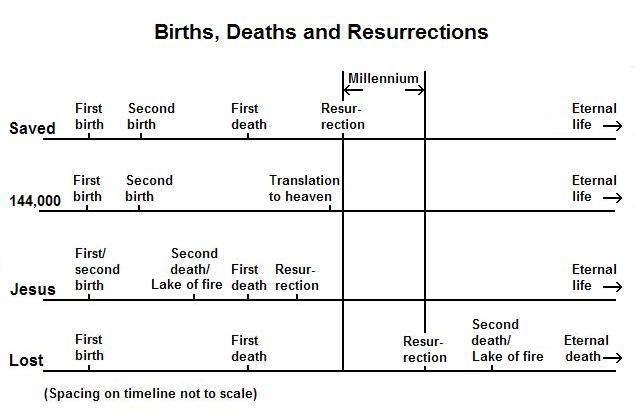 |
 |
 |
Resurrection After DeathResurrection after death is something we can look forward to. The state of death must be properly understood to understand resurrection after death. There are many verses that show that death is a state in which there is no conscious thought or awareness. For example: "For the living know that they shall die: but the dead know not any thing, neither have they any more a reward; for the memory of them is forgotten. Also their love, and their hatred, and their envy, is now perished; neither have they any more a portion for ever in any thing that is done under the sun. ... Whatsoever thy hand findeth to do, do it with thy might; for there is no work, nor device, nor knowledge, nor wisdom, in the grave, whither thou goest." (Eccl 9:5-6,10) "The dead praise not the LORD, neither any that go down into silence." (Psa 115:17) This is part 3 of a 5-part study on Birth, Death and Resurrection (part 1). Go back to part 2 - the Second Death We are examining the relationship between births, deaths and resurrections as shown in the following didagram:  Many people have misunderstood this verse: "No man taketh it from me, but I lay it down of myself. I have power <1849> to lay it down, and I have power <1849> to take <2983> it again. This commandment have I received <2983> of my Father." (John 10:18) The word translated as "take" is the same word that is, later in the same verse, translated "received." The correct meaning, in this case, is to receive as it is more often translated. This is also backed up by about 20 verses that say the Father raised His Son. Also, the Greek word (exousia) translated as "power" can have the meaning of "authority." Even in many verses where it is translated as power, it could be understood to have the meaning of "authority." There are many verses that show that it was the Father Who raised Jesus from the dead. Here is an example: "Paul, an apostle, (not of men, neither by man, but by Jesus Christ, and God the Father, who raised him from the dead;)" (Gal 1:1) Here is a list (probably incomplete) of such verses: Acts 2:24, 3:15,26, 4:10, 5:30, 10:40, 13:30,33,34,37, 17:31, Rom 4:24, 8:11, 10:9, 1 Cor 6:14, 15:15, 2 Cor 4:14, Gal 1:1, Eph 1:20, Col 2:12, 1 Thess 1:10 1 Pet 1:21 We need to understand that resurrection after death is resurrection from a state of complete death with no consciousness. If Jesus' divinity was conscious in death (if the humanity only died) then it was only a human sacrifice. Hovwever, He died completely; it was a total sacrifice. We can look forward to resurrection after death because He was willing to die completely - even the second death - in our place. The next part of this series on will consider the special resurrection (part 4) that was the experience of certain individuals. |
Prophecy Newsletter
Receive
free newsletters
reporting and analysing world events related to prophecy.
The Greek has multiple words for forgiveness? God forgives (charizomai) whether we ask or not. Receiving forgiveness (apheimi) is by our choice.
God always forgives!
|
|
|
|
||
|
| ||

New! Comments
Have your say about what you just read! Please leave a comment below.